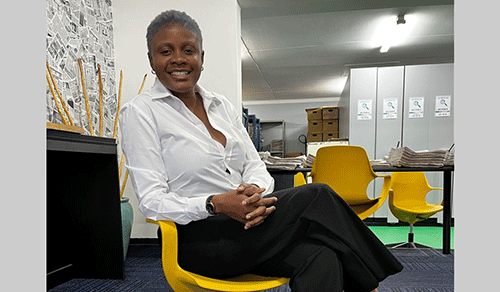THE Namibian sporting landscape is in crisis, and it’s time we face the cold, hard truth. While the country is blessed with a wealth of athletic potential, from budding football stars to track and field prodigies, there’s a stubborn roadblock preventing this talent from flourishing.
That roadblock, quite frankly, is a sport industry that’s drowning in poor management, funding shortages, and a lack of accountability.
Let’s start with the elephant in the room: funding. The government, despite what it may want us to believe, has consistently provided a pittance for sport. This miserly budget falls woefully short of what’s needed to not only support athletes but also to cultivate the infrastructure necessary for the industry to thrive. It’s no surprise that we have run-down facilities, outdated equipment, and a system that looks like it’s stuck in the ’90s.
The reality? We’re watching athletes – many of whom show incredible promise – training with subpar gear, under-prepared, and underfunded. It’s a paradox. The very people who should be driving the sport sector forward are, instead, letting it limp along.
Of course, it’s easy to blame the government, but there’s more at play here. A far more insidious issue is the lack of qualified personnel within our sporting circles. We’re not talking about a lack of passion here. No, passion exists in abundance. The problem is that passion without expertise is like a car without an engine. Sure, it might look good on the outside, but it’s not going anywhere.
Many of our coaches and trainers, the very people expected to help nurture our athletes into world-class competitors, are either under-trained or lack the experience required to do their jobs effectively. Some even resist advice or refuse to adapt to modern coaching methodologies. It’s like trying to get a man to see a doctor about his gangrenous foot, but the man insists on keeping his shoes on and ignoring the obvious problem.
This denial – coupled with a culture of mediocrity – is what we are forced to deal with every day.
And it’s high time we say: enough is enough. This mediocrity is no longer tolerable.
I am sure you know the federations and administrators who are guilty of this behaviour. But in the spirit of the festive season, I’ll bite my tongue, for now. Let’s just say this: the time for authoritarian practices, like creating WhatsApp groups, adding sport journalists and then dictating terms of conversation.
Federations aren’t kingdoms for administrators to rule as they please. It’s about teams, collaboration, and listening. The days of dictatorship in Namibian sports must be numbered.
And I know what you’re thinking – isn’t it always the same? Administrators treating federations like personal backyard businesses, making selections based on who’s related to whom, rather than merit? Nepotism is like a silent assassin in Namibian sport, and it’s killing the industry slowly but surely.
An athlete’s success should never be determined by how close they are to an administrator or coach. It should be based on merit, hard work, and raw talent. Full stop. This is the only way Namibia will stand a chance on the world stage.
But the problem doesn’t stop at the athletes. Let’s talk about the coaches. Far too many coaches are quick to jump in front of the media when it’s time to collect the spotlight, but when it comes time to hold them accountable or ask for real answers, they vanish faster than a sprinter at the starting line.
This double standard is simply unacceptable. Coaches and administrators need to be transparent and willing to face scrutiny if they expect continued support and media coverage.
And can we please talk about press conferences for a second? If you schedule a media briefing for 10h00, it better start at 9h50 – with everything in place. Stop shuffling chairs around at the last minute or delaying the briefing because a media house is running late.
Timeliness and professionalism matter. If we want to be taken seriously, we need to show up and act like we deserve to be.
Looking to the future, especially with the 2028 Los Angeles Olympics looming in just four years, Namibia cannot afford to hit snooze on preparation and hope for a miracle. The time to act is now. We need to identify funding opportunities, invest in athletes, and provide them with the best training and equipment. No more subpar kits that come from backdoor deals designed to line someone’s pockets. No more excuses. We need to plan and act – today, not tomorrow.
It takes real courage to stand up in front of the powers that be and say, “This system is broken, and I am willing to listen to feedback to fix it.” It takes even more courage to face the backlash that often follows such honesty. But if Namibia is serious about becoming a sporting powerhouse, it will require brave leadership at the federations and skilled consultants who are willing to influence the system at a deep, systemic level.
In the end, the future of Namibian sport hinges on our collective willingness to demand better. Better governance, better coaching, and better support for our athletes. It’s time to step into 2025 with a renewed commitment to excellence. Anything less is simply unacceptable.
-lmupetami@nepc.com.na


